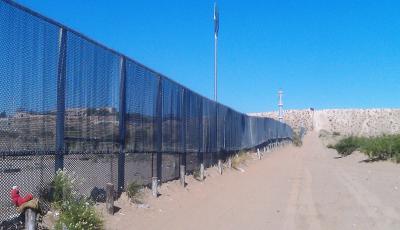On Departures, Transits and Destinations: The Facilitation of Human Smuggling
Posted:
Time to read:
Post by Gabriella Sanchez, assistant professor in human security at the University of Texas at El Paso and author of Human Smuggling and Border Crossings (Routledge, 2015). Follow her on Twitter @border_views. This post is the first installment of Border Criminologies themed series on Human Smuggling organised by Gabriella.
I asked Antonio Serdan, suspect number 22, if there was a coyote who crossed with the group but he said there wasn’t. I asked him how much it was going to cost him to cross the border and he told me it wasn’t costing anything. I asked him to tell me what he meant. He said they got together

This isn’t to suggest the practice of smuggling doesn’t sometimes involve abuse. There is a large corpus of migration scholarship documenting the kinds and the extent of the victimization those on the move face at the hands of smuggler facilitators, ranging from scams, intimidation, and physical abuse to sexual assaults, extortion, and kidnapping.
Yet, smugglers are neither the only source of the violence migrants and asylum seekers face during their transits and nor do their actions take place in a vacuum. The machinery set in place through the interaction of international immigration and refugee law, foreign governments, humanitarian agencies, corporations, the global prison industrial complex, and local law enforcement, among others, is often even more effective at creating conditions conducive to victimization, sometimes in forms that make smuggling’s hidden charges, prolonged delays, or poor housing conditions look inconsequential. Furthermore, there’s growing recognition of the fact that that without the support of smugglers―and the demonstrations of solidarity that also characterize many of these transits―the incidence of violence and death among migrant and refugees would be even higher.
The present blog series on human smuggling reflects on some of these issues. From Jakarta, Antje Missbach writes about the Australian government’s attempts to ‘break the people smugglers’ business model’ which have led to the criminalization of fishermen in Indonesia and the emergence of survival practices in refugee camps. Contributions by Fabrice Langrognet and David Danelo on labor and warfare history provide an all too often absent perspective in current smuggling scholarship. Both pieces are evocative of the recent reporting on well-intentioned European ‘citizens’ who by ‘defying’ international law ‘assist’ refugee seekers and rush to their rescue―in stark contrast to the racialized and gendered depictions of smugglers as predatory men of color exploiting their own, a characterization that raises questions over the construction of racialized hierarchies of morality in the facilitation of irregular migration transits. Luigi Achilli brings us with him to the Mediterranean to explore the ways that many of those in transit become smuggling entrepreneurs themselves, having failed in their attempts to reach their destinations, relying instead on the economies of survival that emerge along the migrant trail. To close the series, Theodore Baird remind us of the pitfalls of conducting research in smuggling, including some of the methodological challenges involved in the study of underground, criminalized economies and the hypervisibility of smuggling in media discourses amid the punitive responses it generates from the nation-state.

Any comments about this post? Get in touch with us! Send us an email, or post a comment here or on Facebook. You can also tweet us.
__________
How to cite this blog post (Harvard style):
Sanchez, G. (2015) On Departures, Transits and Destinations: The Facilitation of Human Smuggling. Available at: https://www.law.ox.ac.uk/research-subject-groups/centre-criminology/centreborder-criminologies/blog/2015/11/departures (Accessed [date]).
Share:








